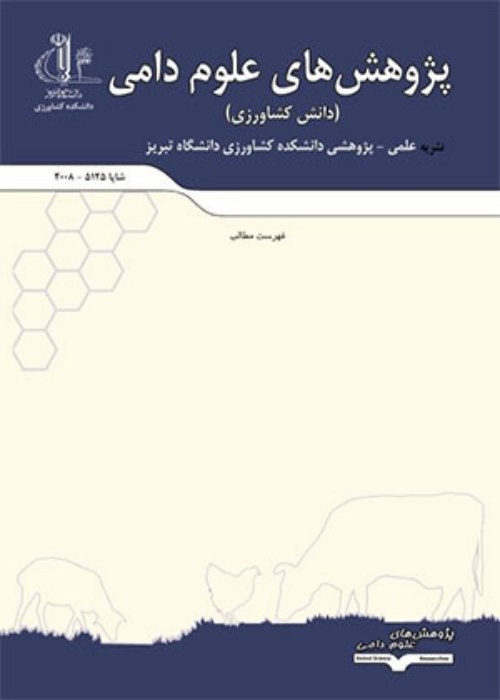An investigation on the effect of different essential oils on feed intake and sheep rumen microbial population
Author(s):
Article Type:
Research/Original Article (دارای رتبه معتبر)
Abstract:
Introdution:
A goal of ruminant microbiologists and nutritionists is to manipulate the ruminal microbial ecosystems to improve the efficiency of converting feed to animal products consumable by humans. The use of feed additives such as antibiotics has proven to be a useful tool to reduce energy (in the form of methane) and nitrogen (in the form of ammonia) losses from the diet. However, scientists have recently become interested in evaluating alternatives for manipulating the gastrointestinal microflora in livestock due to the increasing public concern about the use of antibiotics in the animal feed industry. Plant extracts have been used for centuries for various purposes (e.g., traditional medicine, industrial applications, food preservatives) due to their antimicrobial properties and because most of them are categorized as GRAS (Generally Recognized as Safe) for human consumption. The use of plant extracts appears to be one of the most natural alternatives to the antibiotic use in animal nutrition. Ruminant microbiologists and nutritionists have been exploring alternative methods of favorably altering ruminal metabolism to improve feed efficiency and animal productivity. Plant extracts contain secondary metabolites, such as essential oils (EO) that have antimicrobial properties that make them potential alternatives to antibiotics to manipulate micro-bial activity in the rumen. Essential oils are naturally occurring volatile components responsible for giving plants and spices their characteristic essence and color. Over the last few years, a number of studies have examined effects of EO, and their active components, on rumen microbial fermentation. Garlic oil (Allium sativa) and clove has been shown to exhibit a wide spectrum of antibacterial activity against gram-negative and grampositive bacteria. In a previous study, garlic oil and clove reduced the proportions of acetate and branchedchain VFA, and increased the proportions of propionate and butyrate and the small peptide plus amino acid N (SPep+AA N) concentration. These changes in the fermentation profile are consistent with those observed with methane inhibitors and have the potential to beneficially modify rumen microbial fermentation. In order to evaluate effects of garlic and clove essential oils on rumen microorganisms, dry matter degradability of ingrediends, two experiments were designed. Material and metheds: First experiment was carried out with three fistulated rams using change over design. Each period lasted 28d. Ruminal fluid was collected in the end of each period. Samplings were performed immediately before and after 2 and 4 hours of morning feeding. In second experiment: an experiment with randomized complete block design containing 3 kinds of feed (straw, alfa alfa, barley) and 2 kinds of essential oils (garlic, clove) in 3 replicates (3 fistulatted sheep) was conducted to determine effects of essential oil on degradability and effective degradability of dry matter. Incubation of feed samples was done in times of 0, 2, 4, 8, 16, 24, 48, 72 and 96 hours.
Results and discussion
The results showed that differences of pH were not significant among treatments. Clove essential oil did not show any effect on total counts of microorganisms, but garlic essential oil significantly reduced rumen total counts. Results of the experiment indicated that by using garlic essential oil in diet, numbers of producing lactic acid bacteria was significantly reduced but clove treatment didn’t affect numbers of producing lactic acid bacteria. Reduction in producing bacteria was observed in all the samples. Garlic and clove essential oil had not significant effect on the number of rumen coliform bacteria, but significantly decreased rumen protozoa bacteria. Number of rumen fluid protozoa was not significantly different from control before morning nutrition (time zero), but 4 and 8 hours after morning feeding, garlic and clove essential oil, significantly reduced rumen fluid protozoa. The results of this experiment showed that garlic and clove essential oil had significant difference with control in dry matter degradability, A, dry matter undegradibility and dry matter effective degradability by passage rate of 2%, 5%, 8% an hour. Significant difference was observed between straw, alfa alfa and barley in dry matter degradability, dry matter undegradibility and effective degradability.
Conclusion
According to the results mentioned that garlic and clove essential oil effected on rumen microorganisms and dry matter degradibility. Plant-derived EO may be a useful means to improve efficiency of nutrient utilization in ruminants and reduce the impact of their production on the environment. At high doses, EO and their constituents may inhibit deamination of AA and reduce methane production in the rumen. The range of EO and their components is complex in terms of nature and activity and variability in their composition may make it difficult to obtain consistent positive responses in ruminant production from these complex mixturesKeywords:
Language:
Persian
Published:
Journal of Animal Science Research, Volume:28 Issue: 2, 2018
Pages:
81 to 96
magiran.com/p1895968
دانلود و مطالعه متن این مقاله با یکی از روشهای زیر امکان پذیر است:
اشتراک شخصی
با عضویت و پرداخت آنلاین حق اشتراک یکساله به مبلغ 1,390,000ريال میتوانید 70 عنوان مطلب دانلود کنید!
اشتراک سازمانی
به کتابخانه دانشگاه یا محل کار خود پیشنهاد کنید تا اشتراک سازمانی این پایگاه را برای دسترسی نامحدود همه کاربران به متن مطالب تهیه نمایند!
توجه!
- حق عضویت دریافتی صرف حمایت از نشریات عضو و نگهداری، تکمیل و توسعه مگیران میشود.
- پرداخت حق اشتراک و دانلود مقالات اجازه بازنشر آن در سایر رسانههای چاپی و دیجیتال را به کاربر نمیدهد.
دسترسی سراسری کاربران دانشگاه پیام نور!
اعضای هیئت علمی و دانشجویان دانشگاه پیام نور در سراسر کشور، در صورت ثبت نام با ایمیل دانشگاهی، تا پایان فروردین ماه 1403 به مقالات سایت دسترسی خواهند داشت!
In order to view content subscription is required
Personal subscription
Subscribe magiran.com for 70 € euros via PayPal and download 70 articles during a year.
Organization subscription
Please contact us to subscribe your university or library for unlimited access!





